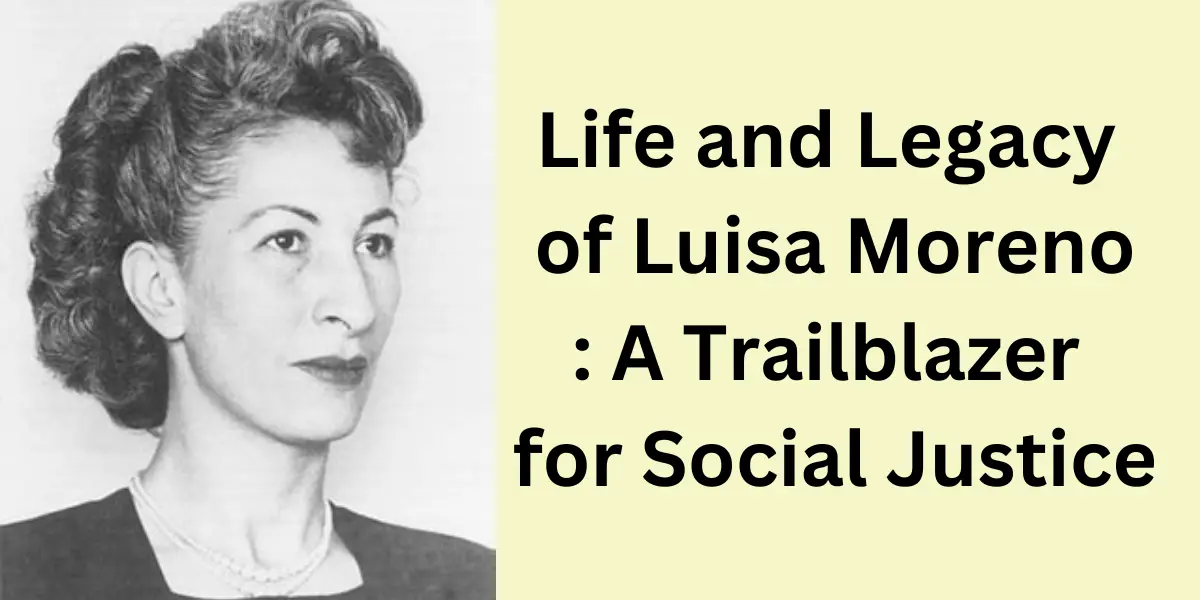Life and Legacy of Luisa Moreno: A Trailblazer for Social Justice

Luisa Moreno, a remarkable figure in American history, is celebrated for her tireless advocacy for labor rights and social justice, particularly for the Latino community. Born in 1907 in Guatemala, Moreno’s journey took her to the United States, where she became a prominent labor leader and civil rights activist. This article delves into her life, achievements, and lasting impact, providing insights into her significance in the fight for equality and justice.
Early Life and Education
Luisa Moreno was born on December 9, 1907, in Guatemala City, Guatemala. Coming from a well-educated family, she was exposed to progressive ideas from an early age. After moving to the United States in the 1920s, she settled in Los Angeles, where she pursued her education and began to engage with the burgeoning labor movement.
Immigration and Cultural Challenges
Upon arriving in the U.S., Moreno faced numerous challenges as an immigrant. She experienced firsthand the discrimination and hardships that many Latino workers encountered. These experiences fueled her passion for activism and laid the groundwork for her future endeavors in labor rights.
Advocacy and Activism
Labor Rights and the United Cannery, Agricultural, Packing, and Allied Workers of America (UCAPAWA)
In the 1930s, Moreno became actively involved in labor organizing. She joined the United Cannery, Agricultural, Packing, and Allied Workers of America (UCAPAWA), where she played a crucial role in advocating for better working conditions, fair wages, and the rights of workers, particularly those from marginalized communities. Her ability to unite workers across ethnic lines was a significant achievement, as it fostered solidarity among diverse groups.
Civil Rights Advocacy
Beyond her work in labor rights, Moreno was also a staunch advocate for civil rights. She recognized the intersectionality of race, class, and gender, and fought against the systemic injustices that affected not only workers but also the broader Latino community. In 1946, she helped establish the League of United Latin American Citizens (LULAC) in California, which aimed to address issues of discrimination and promote civic engagement among Latino citizens. Moreno’s efforts were pivotal in raising awareness about the challenges faced by the Latino community and advocating for their rights.
Legacy and Impact
Contributions to Social Justice
Luisa Moreno’s contributions to social justice extend far beyond her lifetime. She inspired future generations of activists and leaders who continue to fight for labor rights and equality. Her work laid the foundation for subsequent movements that addressed the rights of immigrants and workers in the United States.
Recognition and Honors
Though her contributions were not widely recognized during her lifetime, Moreno has since been honored for her activism. In 1995, she was posthumously inducted into the Labor Hall of Fame, acknowledging her significant impact on the labor movement and her role in advocating for the rights of workers.
Conclusion
Luisa Moreno’s life is a testament to the power of activism and the importance of fighting for social justice. Her legacy continues to inspire individuals and organizations dedicated to advocating for the rights of workers and marginalized communities.
FAQs
Q1. Who was Luisa Moreno?
Luisa Moreno was a prominent labor leader and civil rights activist born in Guatemala in 1907. She is best known for her advocacy for labor rights and social justice, particularly for the Latino community in the United States.
Q2. What were Luisa Moreno’s major contributions?
Luisa Moreno’s major contributions include her leadership in the United Cannery, Agricultural, Packing, and Allied Workers of America (UCAPAWA) and her role in founding the League of United Latin American Citizens (LULAC) in California. She fought for better working conditions, fair wages, and civil rights for marginalized communities.
Q3. Why is Luisa Moreno considered a trailblazer?
Luisa Moreno is considered a trailblazer because she broke barriers in labor organizing and civil rights advocacy during a time when women and people of color faced significant discrimination. Her ability to unite diverse groups of workers and her commitment to social justice has left a lasting impact.
Read More About: Jimmy Buffett Wife aka Jane Slagsvol Smorgasbord: Unveiling her Life



Leave a Comment